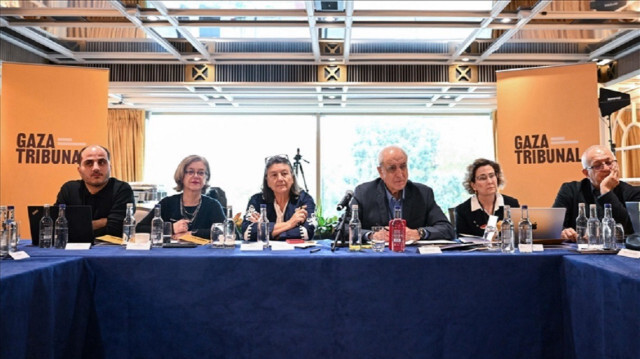
Tribunal takes alternative route to international justice, aiming to spotlight voices from civil society in examination of abuses following conflict that escalated after Hamas-led attacks on Israel on Oct. 7, 2023
A group of academics, intellectuals, human rights advocates, and representatives from the media and civil society organizations gathered in London last week, the capital of the UK, to launch the symbolic “Gaza Tribunal," an independent initiative serving as a "court of humanity and conscience."
Led by Richard Falk, a distinguished international law expert and former UN special rapporteur on the occupied Palestinian territories, the tribunal is taking an alternative route to international justice, aiming to spotlight voices from civil society in the examination of abuses following the conflict that escalated after Hamas-led attacks on Israel on Oct. 7, 2023.
The Gaza Tribunal, which convened for two days of initial preparatory meetings in London, brought together around 100 participants.
Its distinguished Presidential Committee includes former UN special rapporteurs Michael Lynk and Hilal Elver, alongside prominent academics such as Noura Erakat, Susan Akram, Ahmet Koroglu, John Reynolds, Diana Buttu, Cemil Aydın, and Penny Green.
The tribunal members comprise well-known intellectuals and advocates from various backgrounds around the world.
Some who attended the London meeting include Ilan Pappe, Jeff Halper, Ussama Makdisi, Ayhan Citil, Cornel West, Avi Shlaim, Naomi Klein, Aslı Bali, Mahmood Mamdani, Craig Mokhiber, Hatem Bazian, Mehmet Karlı, Sami Al-Arian, Frank Barat, Hassan Jabareen, Willy Mutunga, Victor Kattan, and Victoria Brittain.
On the first day of the London meeting, a special session was held with representatives from Palestinian civil society organizations and human rights groups, which will play a crucial role in the tribunal’s proceedings.
Among the participating organizations were Law for Palestine, the Palestinian Environmental NGOs Network, the Arab Network for Food Sovereignty (APN), Adalah, the Legal Center for Arab Minority Rights in Israel, Palestinian human rights organization Al-Haq, BADIL, Al-Mezan Center for Human Rights, the prisoner support and human rights group Addameer, and the Palestinian Center for Human Rights (PCHR).
- Tribunal structure and upcoming phases
The tribunal’s sessions in London focused on establishing operational strategies, logistical processes, and communication principles.
According to organizers, the Gaza Tribunal’s second phase is scheduled for May 2025 in Sarajevo, Bosnia and Herzegovina, where prepared reports, witness statements, and draft declarations will be shared with the public.
Representatives of affected communities and expert witnesses are expected to speak at the Sarajevo session.
The tribunal’s main hearing, a crucial part of the initiative, is planned for October 2025 in Istanbul, Türkiye.
In Istanbul, an expert panel will present a draft of the tribunal’s findings and decisions, incorporating testimonies from witnesses and statements from Palestinian civilians and organizations affected by the crisis.
The tribunal intends to produce legally credible recommendations and raise global awareness of the crisis in Gaza.
Special decisions with authority and recommendations will also be announced based on the latest developments in the Gaza Tribunal process.
- Forum for alternative justice
The tribunal's formation reflects growing frustration with the perceived constraints and delays in formal international justice systems, such as the International Court of Justice (ICJ) and the International Criminal Court (ICC), where cases regarding the Israeli-Palestinian conflict have been slow to make progress.
Despite the ICJ and ICC’s ongoing investigations – one of which includes a South Africa-led case against Israel alleging violations of the Genocide Convention – the Gaza Tribunal's organizers argue that these official bodies are often limited by extensive procedures and external political pressures.
In a statement, the tribunal emphasized its commitment to inclusivity and accessibility, inviting Palestinian civil society groups and individuals directly affected by the conflict to submit evidence and testimony.
This body, organizers say, aims to fill a gap by focusing on the human impact of Israel’s policies and actions on Palestinian civilians.
Beyond addressing recent events, the tribunal’s legal framework will integrate themes of settler-colonialism and apartheid, contextualizing its findings within the decades-long Israeli-Palestinian conflict and historic events such as the 1948 Nakba and Israel's occupation of Palestinian territories post-1967.
According to the organizers, the Gaza Tribunal "derives its power and authority not from governments but from the people in general and Palestinians in particular, that uses the intellectual and conscientious accumulation of humanity, with which anyone with common sense can agree and that can produce judgments and documents to which one can refer regarding future problems."

